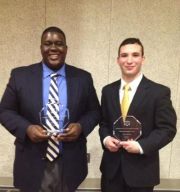
EWING, NJ… A team of two college students placed second in a national tournament for aspiring lawyers that took place Jan. 13-14 at the American Collegiate Moot Court Association 2012 National Tournament.
The team, senior political science major Olaniyi Solebo and freshman history major Andrew Wallach, gave the best showing of any Moot Court team in College history – outperforming 80 teams (160 students total) from 35 colleges and universities at the competition, which took place at Chapman University Law School in Orange, CA.
Solebo, who also serves as the president of the College’s Student Government, also won tenth place in the top orator competition.
“TCNJ’s showing this year establishes the college as a strong moot court program and my goal for the future is to continue to do well in both regional and national competition… Our showing this year is one more indication of the quality of the college’s students and academic program,” said professor of political science and moot court coach Daryl Fair, who called the second-place finish the College’s “best-ever” performance.
According to Fair, in November of last semester, the school took five teams to the ACMA’s Easter Regional Tournament at Fitchburg State University in Massachusetts and three of those teams — including Solebo, Wallach, and two other teams comprised of Abigail Wallach, Rebecca Stefaniak, Angela Kerins and Rebecca Kelley — qualified for the national tournament.
These three teams represented one fourth of the teams that qualified for nationals, out of 48 teams that competed at the tournament. Nationally, 279 teams competed at regional tournaments across the state.
Solebo and Wallach narrowly missed first place, losing their last argument in the competition case on a “2-1 split decision,” said Fair, who teaches a course, POL370/Topics in Political Science: Moot Court, which simulates the moot court tournament experience before the regionals in November.
According to the moot court webpage, students in the class compete in teams of two with each student arguing one of two issues presented by a fictitious case. Teams have to be prepared to argue both sides of the case and are required to argue each side at least once in the first two rounds, explained Fair.
“The mantra for moot court participants is prepare, prepare, prepare, practice, practice, practice,” said Fair. “Obviously, Olaniyi and Andrew followed this advice and this is one of the reasons they did well. In addition, Olaniyi has a speaking style that lends itself very well to moot court, and his showing in the orator competition shows that.”
At the national tournament, this case was “Chester Comerford vs. United States,” which involved a First Amendment freedom of speech issue and a Fourth Amendment search and seizure issue.
“The competition case, if an actual case, would have been one of the most groundbreaking cases in Supreme Court history. If decided, the first and fourth amendment issue, regardless of the decision of the court, would have changed the application of both of these inalienable rights,” said Solebo. “It was generally exciting to argue the philosophy of the law, the application of the law, and the future of the constitution.”
Wallach also expressed interest in the competition case ― specifically, its discussion of Internet law.
“It was really interesting to build arguments in an area where there is no established legal precedence,” he said. “I also found it fascinating that it delved into government powers on the Internet, which in light of SOPA and PIPA, is a highly contentious issue.”
According to Fair, other competing schools included several historically strong moot court programs, including The College of Wooster, The College of the Holy Cross, California State University-Fullerton, Fitchburg State University, and 2012 first-place finisher Patrick Henry College, now the ACMA’s six-time national champion. The College was the only New Jersey school represented at nationals.
According to Wallach, a first-time Moot Court participant, his and Olaniyi’s second–place finish could not have come without Olaniyi’s “outstanding” performance, the “calming presence” of Dr. Fair, and the support they received from the other TCNJ participants and other schools. This included the support of his sister Abigail Wallach, a senior history major and 2010-11 Moot Court participant, who Wallach said “taught (him) everything” he knows about Moot Court.
“Oral argument is absolutely exhausting and nerve wracking but extremely fun…,” he said. “(Abigail), along with the other TCNJ participants, made jokes and calmed Olayini and I down. They truly made the situation enjoyable.”
Solebo, who had been doing Moot Court for two years at the College and was participating in his second national competition, said he was “humbled” by the experience.
“Placing second was genuinely one of the most humbling experiences in my life so far. It was the honest result of hundreds of hours of teamwork. I couldn’t have done this without my partner Andrew, my coach Dr. Fair, the guest judges, and the other members of the moot court team,” said Solebo.
